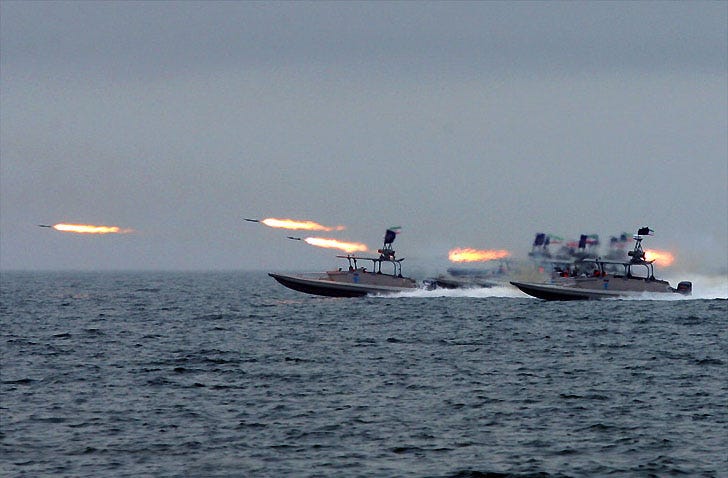Good Morning!
When you’re watching the evening news, it seems as if the Covid-19 epidemic is the only thing happening in the world. Unfortunately, this is not true. In this edition of Political Disruption, we look at two other events that would usually grab the headlines: increasing tensions between the US and Iran and increasing Chinese assertiveness in the South-China-Sea.
Enjoy this issue!
Hans (@hans_diels )
P.S. Please share this issue this week with all your colleagues who need some distraction from their umptieth zoom/teams/… call.

IRGC Navy commandos and missile boats in Great Prophet IX Maneuver in the general area of Strait of Hormuz, Persian Gulf, 2015. (Source: sayyed shahab-o- din vajedi)
US-Iran tensions
What’s happening? Tensions between the US and Iran are increasing. Most recently a US military official had to walk back President Trump’s claims threat to “shoot down” Iranian gunboats. The official stated that the President just meant that US ships “retain the right of self-defense.” Iranian ships have been harassing US warships in the Persian Gulf, coming as close as nine meters. The Iranian Revolutionary Guard Corps (IRGC), Iran’s elite regiment, has used such “swarming” tactics before. The IRGC’s leader responded with a counterthreat to “destroy” any US forces infringing its security in the Gulf.
Is there a risk of escalation?
With distances of nine meters between enemy ships, an accident is just waiting to happen.
Tensions have been tense already with the US increasing economic sanctions on Iran, Iran increasing proxy attacks on American targets in the Gulf region (especially in Iraq), and harassing ships in the Gulf since the US killed the IRGC’s leader General Qasem Soleimani.
Both the US and Iran are coping with strong criticism for their respective government's approach to handling the Corona-outbreak and might try to show their strength in an ill-fated foreign adventure.
Why should we care?
Given the extremely low oil prices at this moment, the impact of conflict in the Gulf will be moderate in the short-term but a protracted conflict could create big disruptions of oil transport and increase prices.
Increased conflict in the Gulf will probably set the complete Middle-East in flames as Iran’s main military capacities are in asymmetric warfare, using proxies to disrupt other countries. We can expect more trouble in Lebanon, Syria, Yemen (where there’s a weak cease-fire now), Saudi Arabia, Israel, and other countries in the region.
South-China Sea
Tensions are also increasing in the South-China Sea region a region where there are many intersecting territorial claims from China and its neighbors. China claims almost the whole region and has been engaged in building artificial islands with military installations on riffs in the Sea. China has been harassing other countries’ ships navigating the Sea. An international court ruled in 2016 that China’s claims in the SSC have no basis in international law.
What has happened now?
On April 18, China created two new municipal districts to administer the disputed regions further creating the semblance of legitimate rule over the region.
Chinese ships trailed a Malaysian ship operation in the SCS near Malaysia.
An Australian warship joined three US ships that were operating in the Sea in an area close to where Chinese ships are allegedly surveying for oil in a show of force.
Why is it extremely risky today?
The Chinese leadership may try to solidify China’s position in the SCS at the same time that other countries are trying to deal with the Covid-19 pandemic.
As in the US-Iran case, an accident can easily happen. It almost happened at the end of 2018 when a US and Chinese warship almost collided. Recently surfaced footage of the incident shows that the Chinese were seriously preparing for a collision and did not plan to back off.
Why should we care?
Conflict in the South China Sea would seriously disrupt world trade with almost a quarter of all global trade passing through the SCS.
Military tensions between the US and China will not help to solve existing trade tensions and will certainly make the trade conflict even more intense.


